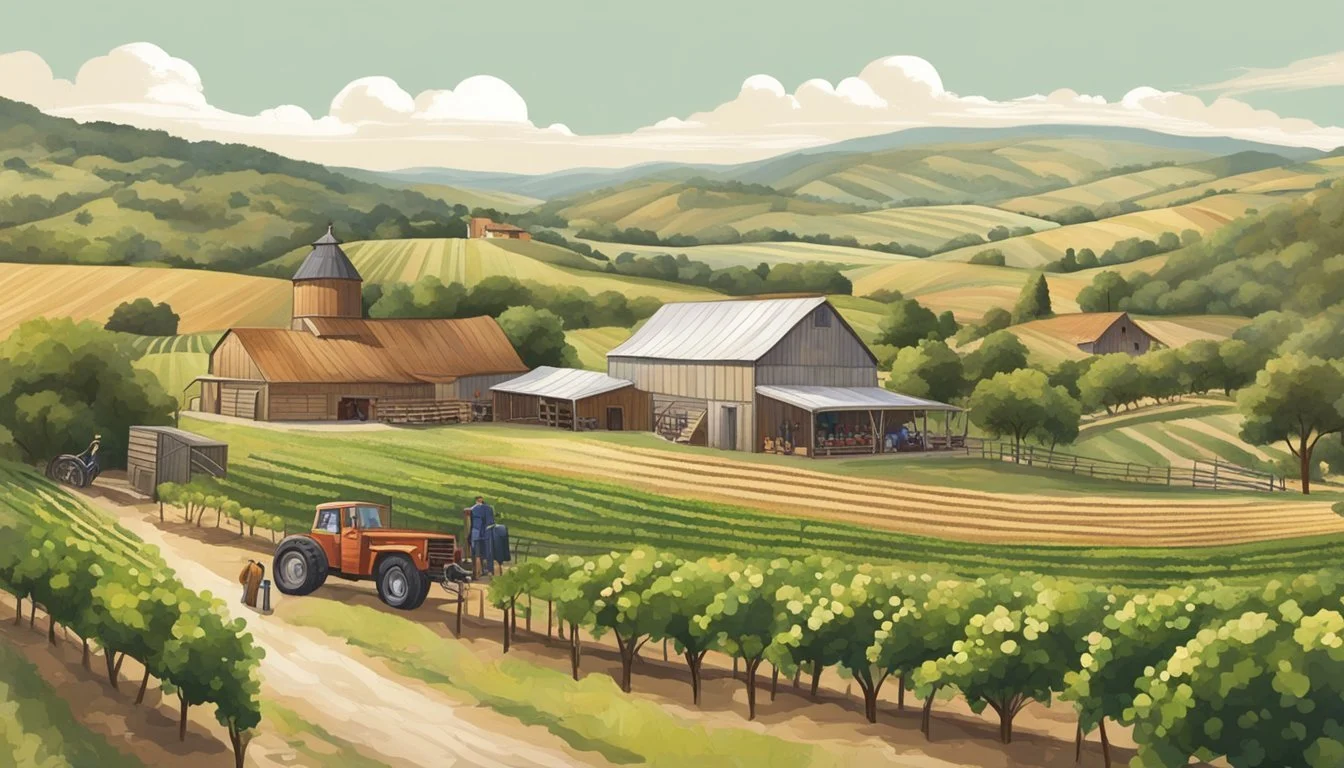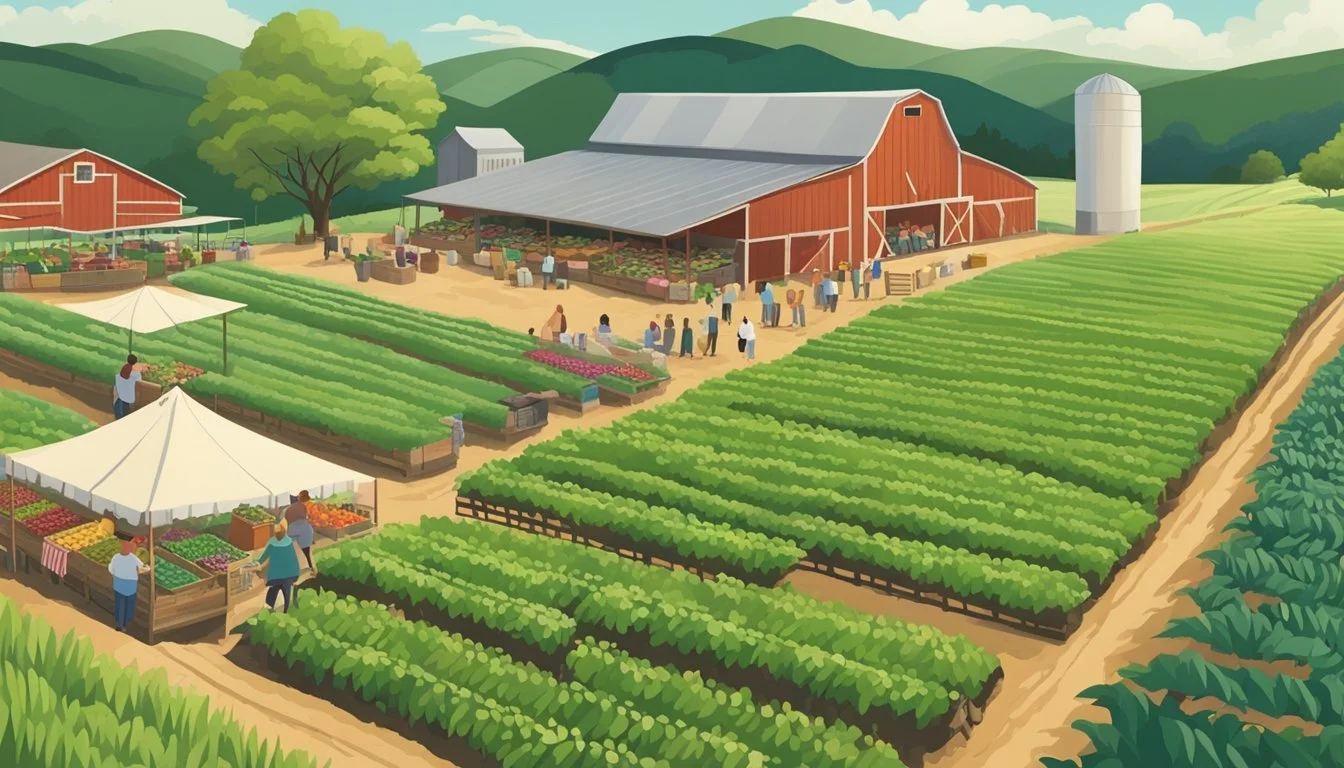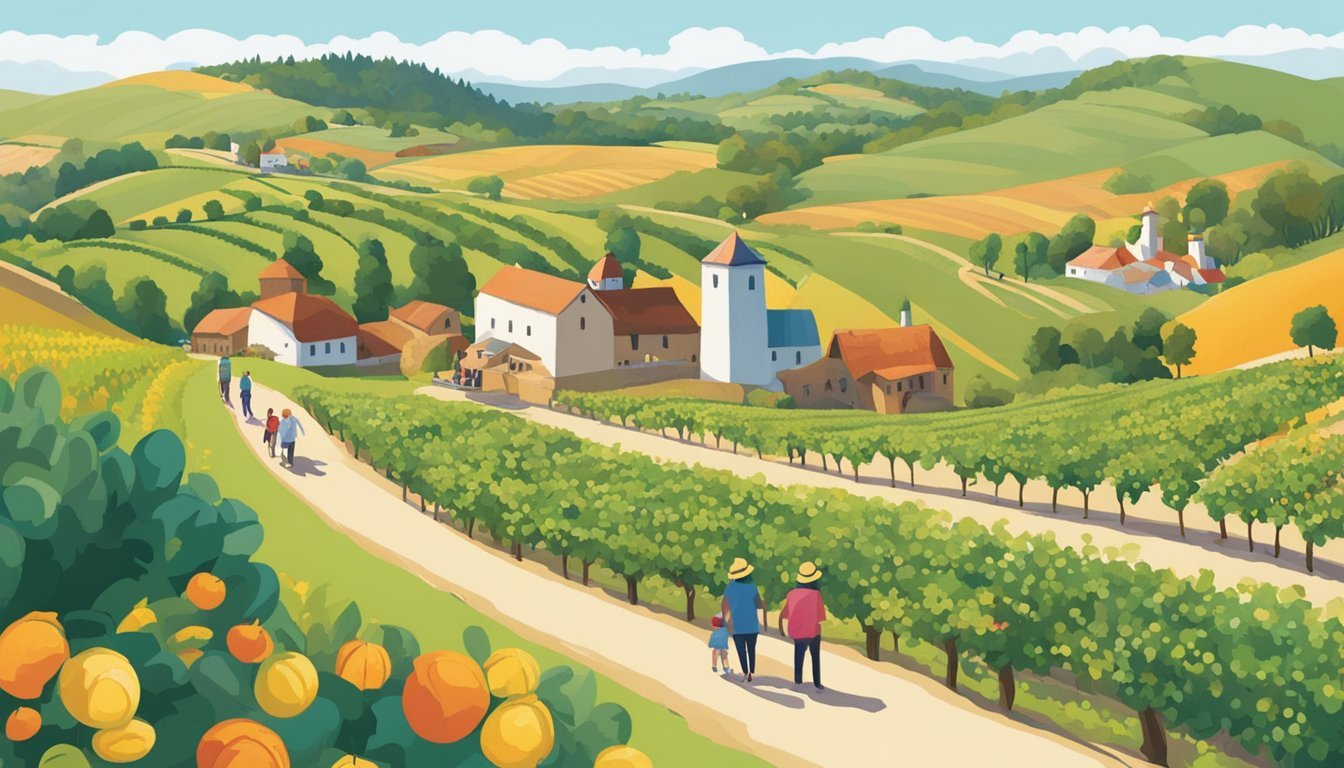Agritourism in North Carolina
Exploring the Farm-Fresh Experience
Agritourism in North Carolina presents an innovative fusion of the state's rich agricultural heritage and the growing interest in experiential travel. North Carolina's diverse landscape and climate offer fertile ground for a multitude of agrarian activities that extend beyond traditional farming. As travelers seek authentic, hands-on experiences, they find North Carolina's agritourism sector ready to offer a blend of educational, recreational, and culinary adventures rooted in the rural way of life.
The state supports this growing industry through organizations like the North Carolina Agritourism Networking Association, which aids local farmers in capitalizing on the trend by connecting them with resources and customers. With over 1,000 farms offering agritourism activities, visitors can engage in a range of experiences, from picking apples in an orchard, exploring historical farmland trails, to touring wineries. These activities not only promote North Carolina's agricultural bounty but also strengthen the connection between consumers and the source of their food, highlighting the importance of agriculture to the state's economy and heritage.
Agritourism ventures in North Carolina also serve a critical role in the sustainability of local communities by offering additional revenue streams for farmers. This collaboration between agriculture and tourism is cultivating the next generation of farmers and ensuring the preservation of the state's picturesque rural landscape. The initiative drives marketing efforts and contributes to the continued vibrancy of North Carolina's agricultural industry, an integral component of the state's identity.
Understanding Agritourism
Agritourism in North Carolina has become a crucial component of the state's agricultural sector, offering educational and recreational experiences that connect consumers with the origins of their food.
Foundations of Agritourism
Agritourism is an innovative agriculture-based operation that merges elements of the tourism industry with the agricultural experience to create a platform for public engagement, education, and entertainment. It represents a strategy utilized by small to large-scale farms to diversify their revenue streams and promote direct interaction with consumers. For North Carolina, agritourism not only supports the livelihoods of farmers but also helps to preserve rural landscapes and traditions.
Key Statistics:
A significant portion of agritourism revenue in North Carolina comes from small farms, with 75% of farms reporting $10,000 or less in sales from agritourism.
The state witnessed a substantial growth in agritourism revenue, increasing the overall value by 35% from 2012 to 2017 according to the U.S. Census of Agriculture.
Agritourism Activities Range
The scope of agritourism activities in North Carolina is broad and varied, catering to different age groups and interests. Activities range from basic farm tours and pick-your-own produce ventures to more elaborate offerings like farm-to-table dinners, workshops, and agricultural festivals.
Primary Agritourism Activities in NC:
Educational Programs: Workshops on sustainable farming practices, animal husbandry, and crop cultivation.
Recreational Experiences: Corn mazes, hayrides, and apple picking.
Social Media Marketing: Farms utilize platforms like Facebook and Instagram to engage with potential visitors and market their agritourism offerings.
By participating in agritourism activities, visitors gain firsthand experience in agriculture and an appreciation for the work that goes into producing the food they consume. This sector also equips farmers with a means to educate the public on farming challenges and agricultural realities, fostering a deeper connection between communities and the agricultural industry.
Exploring North Carolina's Agritourism
North Carolina's agritourism offers engaging experiences that blend the state's rich agricultural heritage with the community-driven efforts, fostering connections through hands-on agricultural activities.
Historical Context
In North Carolina, agritourism has historical roots, as farming has always been central to its identity and economy. The state is known for its diverse agricultural outputs, ranging from traditional tobacco farms to innovative agritourism ventures that offer insight into the local culture and history.
Regional Specialties
North Carolina’s agritourism is marked by a rich tapestry of regional specialties. Whether it’s the sweet muscadines from vineyards in the Yadkin Valley or the crisp apples from orchards in the Blue Ridge Mountains, each region of North Carolina offers unique agritourism experiences that highlight local crops and culinary delights.
Key Produce of North Carolina:
Apples
Grapes
Sweet Potatoes
Peaches
Poultry
Hogs
North Carolina Agritourism Networking Association
The North Carolina Agritourism Networking Association (NCANA) serves as a cornerstone for promoting agritourism within the state. It connects agritourism professionals and farmers, facilitating knowledge exchange and networking opportunities. The association drives community engagement, enhancing the visibility and sustainability of agritourism operators in North Carolina.
Family and Educational Activities
North Carolina's agritourism venues provide educational and interactive experiences for families, connecting them with the practice of farming and sustainable living. These activities are designed to foster a deeper understanding of agriculture among visitors of all ages.
Connecting With Farming
Many family farms across North Carolina welcome visitors to engage firsthand with day-to-day farm operations. U-Pick berry farms offer the chance for families to harvest their own fresh produce, creating a tangible connection between the food they eat and the land it comes from. Fall seasons are particularly vibrant, with activities such as pumpkin picking, hayrides, and navigating corn mazes. Visiting children often delight in encounters with farmyard animals, which can include bunnies, pigs, and goats. Such activities not only entertain but also connect families directly to farming.
Educating the Public
Agritourism initiatives also serve to educate the public about the importance of agriculture in North Carolina. Farms host educational tours that sometimes incorporate historic trails and buildings, offering insights into the state's agricultural heritage. Additionally, some agritourism sites offer classes and workshops that teach skills from cheese-making to beekeeping. The success of North Carolina women in agritourism is highlighted through specialized tours that feature female-led farm operations. Moreover, venues often arrange seasonal events with live music, allowing families to enjoy local culture in a farm setting, thereby educating through immersive tourism activities.
Agricultural Practices in Focus
Agritourism in North Carolina places a spotlight on the agricultural practices adopted by local farms, emphasizing the benefits of sustainable methods and the exploration of diverse farming operations.
Sustainable Agriculture
Farms in North Carolina are increasingly adopting sustainable agricultural practices to ensure long-term productivity and environmental health. These might include techniques such as:
Crop rotation: to maintain soil health and reduce pest infestations.
Conservation tillage: which limits soil disruption, thus preserving soil structure and biodiversity.
Integrated pest management: a strategy that uses a variety of environmentally sensitive approaches to pest control.
Water conservation: such as rainwater harvesting and drip irrigation to minimize water use.
Diverse Farming Ops
The state's agricultural sector recognizes that farm diversification is essential to economic resilience. Farms are broadening their operations by:
Introducing agritourism opportunities such as corn mazes and pick-your-own produce.
Exploring alternative cash crops beyond traditional tobacco to include commodities like organic produce or specialty herbs.
Developing educational programs to engage and inform the public about farming and sustainability.
When considering an agritourism enterprise, farmers assess their resources carefully to create experiences that are both educational and entertaining, while also showcasing the state’s agricultural diversity.
Types of Agritourism Enterprises
North Carolina's agritourism is diverse, offering consumers experiential agricultural activities ranging from U-Pick orchards to unique farm stays.
U-Pick Orchards
U-Pick orchards, an integral part of North Carolina's agritourism, invite visitors to harvest their own fresh produce. At these orchards, guests can handpick a variety of fruits, such as apples, peaches, and berries, often during peak season. Millstone Creek Orchards is one example that invites families to engage in this immersive experience, providing not only fresh, local food but also educational farm tours.
Artisanal Farm Products
Farms across the state produce a wide array of artisanal products. These include handcrafted cheeses, homemade jams, freshly milled grains, and even local wines. Touring wineries and small-scale farmsteads offers guests insight into the production process and the opportunity to purchase unique and high-quality offerings directly from the source. Items like locally-laid eggs and goods from traditional stone mills reflect the region's commitment to preserving agricultural heritage and promoting local food.
Farm Stays
Farm stays serve as a cornerstone of agritourism in North Carolina, providing visitors with an authentic experience of farm life. Guests may stay on a working farm, assisting with daily tasks or simply enjoying the pastoral setting. These stays often offer educational components, allowing guests to understand the intricacies of sustainable farming practices firsthand. Such experiences deepen the visitor's appreciation for agriculture and the food journey from farm to table.
Products and Harvests
North Carolina's agritourism is richly diverse, offering a broad spectrum of products that range from traditional crops like tobacco to a variety of fruits and animal products. Visitors can experience the state's agricultural bounty firsthand, witnessing the cycle of growth and harvest throughout the seasons.
Seasonal Crops
In the spring and summer, berries take center stage, with blueberries, blackberries, and strawberries among the favorites. Farms often invite visitors to partake in U-Pick activities for these berries. Orchards produce a variety of apples and peaches, making for popular picking destinations in the fall. The state's climate also supports the growth of grapes, which are harvested for both table consumption and the local wine industry. Fall is synonymous with pumpkins and agritourism sites frequently offer pumpkin picking and related festivities.
As for grains, farms grow corn, which is used for both food and as a staple for autumn corn mazes, another agritourism attraction. Though less common than it once was, some farms still grow tobacco, a historically significant crop in North Carolina's agricultural landscape.
Animal Husbandry
The livestock sector adds to North Carolina's agritourism allure. Dairy cows and goats are prevalent on farms for producing milk, cheese, and other dairy products. With an increasing interest in local and artisanal foods, these items are quite popular with visitors.
North Carolina is notable for its pork production, with farms raising pigs for various pork products. Similarly, beef cattle, buffalo, and lamb offer a glimpse into the meat production process. Poultry is not left out, with chickens, turkey, and ducks being significant for both eggs and meat.
Additionally, beekeeping has become an integral part of farm operations, with many offering honey tastings and educational experiences about the importance of bees in agriculture.
Farms may also specialize in fiber, with animals such as sheep and goats contributing to the local textile crafts scene.
Agriculture and Community
In North Carolina, agritourism is significantly intertwined with community enhancement and societal well-being. It fosters local food movements and supports the fabric of community building.
Local Food Movements
Local food movements in North Carolina have gained momentum partly due to agritourism. They are integral to community and societal well-being, emphasizing the importance of consuming produce that is grown and harvested within the region. This local focus supports family farms and women in agritourism by creating direct sales opportunities and increasing visibility.
Nonprofits and societal well-being labs work in tandem with agritourism to bolster these movements.
Consumers gain education on the origins of their food, leading to more informed choices.
Community Building and Support
Agritourism acts as a catalyst in rural community development by offering educational and recreational activities that strengthen connections between farmers and the public.
Families and nonprofit organizations participate in and promote events that support farming operations.
Women in agritourism often lead initiatives that contribute to a supportive network for rural enterprises.
The emphasis on community involvement and support not only aids in maintaining robust local economies but also enriches the cultural fabric of North Carolina's rural areas.
Marketing Agritourism
In North Carolina, the marketing of agritourism is critical for connecting consumers with the authentic farm experience and enhancing the revenue streams for local farmers. Effective strategies include direct farm marketing as well as leveraging digital platforms and social media for outreach.
Direct Farm Marketing
Direct farm marketing is vital in agritourism, allowing producers to sell their products and experiences straight to the visitor, enhancing profitability and fostering a strong consumer-farmer relationship. Key tactics include:
Hosting farm tours and seasonal events to engage visitors
Operating farm stands or pick-your-own operations to market fresh produce
Digital and Social Media Strategies
The implementation of digital and social media strategies is essential for reaching a broader audience and creating a robust online presence:
Social Media Platforms: Use platforms like Facebook, Instagram, and Twitter to share engaging content such as farm stories, harvest updates, and events.
Email Marketing: Keep visitors informed with regular newsletters providing details on upcoming activities and exclusive offers.
By employing these strategies, North Carolina farmers can amplify their agritourism ventures, promote local agriculture, and contribute to the state's rural economy.
Agritourism Logistics
Agritourism presents unique logistical challenges and opportunities. Farmers in North Carolina must navigate legal requirements and optimize their infrastructure to reap the economic benefits.
Legal and Regulatory Considerations
Farmers must comply with various regulations at the local, state, and national levels. These encompass zoning laws, health and safety standards, and liability insurance requirements. The North Carolina General Assembly has enacted specific statutes to address agritourism's distinctive features. They must also be aware of the Agritourism Liability Protection Act, which offers some protections to agritourism operators from the inherent risks associated with farm activities.
Resources:
Visit NC Farms App: A comprehensive tool to understand regulations.
North Carolina Department of Agriculture & Consumer Services: Provides current legal guidelines.
Infrastructure and Resources
Successful agritourism requires appropriate infrastructure and resources. This means adequate parking, wayfinding signs, visitor facilities, and a warm welcome area are crucial.
Parking and Wayfinding: Easily navigable parking and clear signage ensure a seamless visitor experience.
Visitor Facilities: It's essential to have restrooms, handwashing stations, and possibly even lodging accommodations like farm stays.
Resource Allocation: Allocating land and personnel to handle increased traffic during peak seasons ensures that visitors receive the full benefits of agritourism.
Economic Benefits:
Diversified income streams
Connection to local markets through apps like Visit NC Farms
Agritourism in North Carolina leverages the state's agricultural heritage to foster economic growth and provide educational experiences for visitors. By successfully managing the logistics of agritourism, farmers can offer engaging on-farm activities while promoting sustainable rural tourism.
Enhancing Visitor Experiences
Agritourism in North Carolina enriches visitor experiences by merging agriculture with tourism, emphasizing hands-on outdoor activities and an authentic taste of country living.
Outdoor and Nature Activities
Visitors in North Carolina have the opportunity to engage in a variety of outdoor and nature-focused activities. Many farms offer wine tours and tastings for those interested in viticulture, suited for various age groups. Nature trails are prevalent, providing a serene way to enjoy the natural environment.
Trails and Natural Exploration: Farms often feature trails that guide visitors through picturesque landscapes and diverse ecosystems.
Animal Encounters: Farms with llamas, alpacas, and other wildlife offer interactive experiences, connecting guests to the rural lifestyle.
Cultural and Country Living
The charm of country living is captured through cultural activities that reflect North Carolina's rich agricultural heritage.
Hayrides and Corn Mazes: An autumn visit typically includes a traditional hayride and navigating a corn maze, both iconic to the country experience.
Working Farm Experiences: Visitors may also participate in day-to-day operations of a working farm, which provides a deeper understanding of rural life.
To find participating locations, the Visit NC Farms app can be a valuable resource, offering detailed information on agritourism spots across the state. These experiences collectively create a genuine connection between visitors and the framework of North Carolina's country living.
Future of Agritourism in North Carolina
Agritourism in North Carolina is poised for growth, tapping into evolving consumer trends and contributing significantly to the local economy and communities.
Trends and Opportunities
Consumer Preferences: There's a noticeable shift towards authentic farm experiences among the public, driving opportunities for agritourism farmers. Visitors are increasingly interested in pick-your-own produce activities, farm stays, and educational workshops. The N.C. Cooperative Extension can play a pivotal role, offering training and resources to farmers looking to diversify their agritourism offerings.
Technology Integration: Advancements in technology are setting a stage for innovative marketing and customer engagement. North Carolina's agritourism businesses can leverage social media platforms and data analytics to reach wider audiences and tailor their services to meet specific customer preferences.
Impact on Economy and Society
Economic Growth: The expansion of agritourism has a multiplicative effect on North Carolina's economy. It generates revenue streams for small-scale farmers and stimulates local businesses by attracting tourists. According to recent figures, a significant number of farms with agritourism activities reported sales of $10,000 or less, highlighting the potential for agritourism to bolster small farm incomes.
Community Development: Agritourism encourages the preservation of agricultural land and traditions, fostering a sense of identity among local communities. It also offers educational platforms for N.C. residents and visitors to understand and appreciate the importance of agriculture in their everyday lives.











